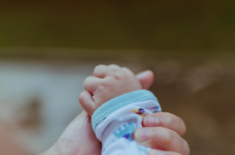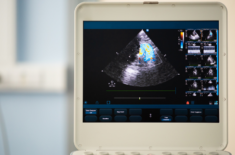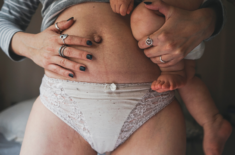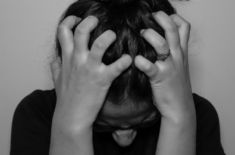Overview
It’s natural for new parents to worry after having a new baby because you’re concerned for their safety and well-being. For example, you might worry about your baby suffocating while they’re sleeping. Those anxious thoughts are normal, especially in your baby’s first year.
However, if you can’t get these intrusive thoughts out of your head or your fears become irrational, you might have postpartum anxiety.
It’s estimated that around 18% of new moms have postpartum anxiety, but it’s less studied and often mistaken for PPD (postpartum depression). (1)
Both of these mental health concerns can affect your health, capacity to care for your baby, and even your little one’s development. It’s crucial to get treatment as soon as possible. (2)(3)
You might be asking questions like:
“What are the symptoms of postpartum anxiety?”
“How will I know the difference from postpartum depression?”
“Why are some women more prone to getting a postpartum anxiety disorder than others?”
“If I have anxiety before pregnancy, will it worsen after childbirth?”
Find answers to the most common postpartum anxiety questions below.
What’s Postpartum Anxiety?
Postpartum anxiety disorder is the exaggerated worry or irrational fear about things linked to your new baby or motherhood. It’s a kind of perinatal anxiety (a diagnosis for pregnant women or up to two years after childbirth).
This condition is similar to general anxiety but develops during the postpartum period (from birth to six months). (4)
Anxiety is part of your body’s stress response to an internal concern. However, this persistent feeling of dread or apprehension persists even after the concern or situation has passed. (5)
This can be due to an overactive sympathetic nervous system, the part of your brain responsible for the fight or flight response. (6)
It can also be because of an overactive amygdala, a part of the brain that oversees emotional responses and states (e.g., pleasure, fear, or anger). (7)
Is Anxiety Normal After Having A Baby?
The prevalence of anxiety and related postpartum mood disorders is high, but not all new mothers experience these conditions. (1)(8)
However, more moms might experience other forms of mood disorders or concerns than anxiety.
For example, 85% of new moms can experience baby blues (feeling weepy or worried for no apparent reason), but the symptoms often go away after a few days without treatment. (9)
In contrast, postpartum anxiety happens to around 18% of new moms. (1)
Postpartum anxiety is closely related to PPD (strong feelings of sadness, anxiety, and worthlessness). So, it’s not surprising that 35% of moms with anxiety might also have postpartum depression. (1)(8)
But postpartum anxiety shows more symptoms relating to anxious behaviors than PPD.
What Are The Symptoms Of Postpartum Anxiety?
These are the most common symptoms: (4)(10)
- Excessive worry
- Feelings of dread or being on the edge
- Persistent agitated feeling
- Churning feeling in your stomach
- Racing thoughts
- Lack of concentration
- Changes in eating patterns
- Sleep disruption (even when your baby sleeps well)
- An overwhelming sense of burden or concern about your ability to be a good parent
- Increased irritability
- Unexplained fatigue or exhaustion
- Muscle tension
When To See A Doctor
Contact your healthcare professional if you experience the symptoms above to get a proper diagnosis. Your healthcare team will create a treatment plan based on your symptoms.
Watch out for these warning signs:
- Symptoms make it difficult for you to do daily tasks or care and bond with your baby
- Worsening mental or physical symptoms
- Thoughts of self-harm or harming your baby
You should call 911 if you experience these physical symptoms, which can signal an emergency: (10)
- Elevated heartbeat
- Hyperventilation or rapid breathing
- Shaking or trembling
- Chest pain
- Nausea or vomiting
- Dizziness
- Chills
- Hot flashes and sweating
- Heart palpitations
- Shortness of breath
It’s important to seek help if you feel like you’re having a panic attack (feeling panicky for unclear reasons).
How Long Will Postpartum Anxiety Last After Having A Baby?
There’s no definite time frame for postpartum anxiety. The good news is that it isn’t permanent, as long as you get treated. (4)
Recovery time can be sooner if you get early treatment, especially for mild anxiety. However, moderate to severe anxiety can last longer or indefinitely if left untreated.
Complications
Postpartum anxiety makes it harder for you to bond with your baby. Studies show that this can negatively impact your baby’s mental and physical development, too. (2)(3)
It can also affect your romantic relationship, with studies showing that some moms diagnosed with postpartum anxiety experience sexual fear or avoidance at 10 weeks after childbirth. (11)
How Do I Deal With Anxiety After Having A Baby?
Here are our top 13 holistic strategies to help you feel better: (11)
- Regular mindfulness meditation
- Deep belly breathing
- Chanting
- Vagus nerve stimulation (a nerve in the parasympathetic nervous system that runs from your head down to your digestive and abdominal organs)
- Regular gratitude practice
- Using essential oils for stress relief and anxiety (e.g., lavender, Roman chamomile, frankincense, etc.)
- Taking a hike or spending time with nature
- Finding support groups and spending time with other moms
- Increasing your physical activity (12)
- Breastfeeding and cuddling with your baby (13)(14)
- Practicing good nutrition for a healthy gut
- Slowing down and letting others help you with daily tasks
- Doing the 3-3-3 rule (see below) (15)
A 2011 study in the Mental Health and Physical Activity journal showed that exercise or physical activity, especially resistance training, can reduce the symptoms of generalized anxiety disorder. (12)
Several studies have shown that breastfeeding can reduce anxiety by releasing prolactin and oxytocin (your body’s love and cuddle hormones). This can help you relax and bond with your baby. (13)(14)
What’s The 3-3-3 Rule For Anxiety?
Every time you’re having racing thoughts, look around you and follow the 3-3-3 rule: (15)
- Name three things you can see
- Name three sounds you can hear
- Move three parts of your body (e.g., ankle, fingers, or arm)
Nutrition For Anxiety
What you eat and the status of your gut health can affect your mental health. (16)
Here are some tips to consider:
- Stay away from sugar because it can worsen anxious feelings and cause an imbalance in your gut (15)
- Eat healthy foods (e.g., grass-fed meat and organic fruits or veggies)
- Increase intake of prebiotics (compounds that promote the growth of beneficial microorganisms or “good bacteria” in your tummy)
Treatment Options
Counseling
After talking with your healthcare provider, they might give you medications or a referral to a mental health specialist for assessment and psychotherapy (talk therapy) options such as the following: (17)
- CBT (Cognitive Behavioral Therapy) – for processing your negative thoughts and improving how you think and act
- IPT (Interpersonal Therapy) – for helping you identify and deal with problems in your personal and other interpersonal relationships
Medications
Your doctor might also prescribe one or a combination of these medications:
- Antidepressants such as SSRIs (selective serotonin reuptake inhibitors) – to increase levels of mood-stabilizing brain chemicals (18)
- Antianxiety medications such as benzodiazepines – to help you relax (19)
What Anxiety Medicine Can You Take While Breastfeeding?
Don’t forget to inform your doctor or healthcare team if you’re breastfeeding because some medications can harm your baby.
According to ACOG guidelines (American College of Obstetricians and Gynecologists), benzodiazepines can be safe for breastfeeding moms as long as their baby doesn’t have an impaired ability to metabolize this drug. (20)
Stop using your medication and immediately call your doctor if your baby experiences sedation or poor feeding.
Causes
The exact cause of postpartum anxiety remains a mystery, but these are possible reasons: (21)(22)
- Hormonal shifts after your give birth
- Sleep deprivation
- Stress in caring for your new baby
- Relationship changes that can occur with your baby’s birth
- Perceived social or personal expectations to be a perfect mother
- Having a premature baby (born before the 37th week of pregnancy)
- Having a baby with health issues, especially if the child is in NICU (neonatal intensive care unit)
Although anxiety is part of your body’s stress response to an internal situation, persistent anxiety might be due to an overactive amygdala or sympathetic nervous system. (5)(6)(7)
Do Hormones Cause Postpartum Anxiety?
Yes. Sudden changes in hormone levels (especially estrogen) can have a greater impact on your mood and cause feelings of anxiety. The sudden drop in these hormone levels can lead to anxious feelings, panic, fearfulness, or increased sensitivity to stress. (21)
Risk Factors
Some of the most common factors that can increase risks for postpartum anxiety: (23)
- Prior miscarriage (pregnancy loss), stillbirth, or infant death (24)
- History of intense mood-related symptoms with your period
- Breastfeeding cessation or weaning your baby (14)
- History of eating disorder
- History of perinatal depression, panic attacks, mood disorders, or other mental health issues (personal or family members)
- Personal or a family history of anxiety, depression, or OCD (obsessive-compulsive disorder)
- Becoming pregnant during teenage years
- First-time moms (25)
- Crisis (job loss, financial problems, or a pandemic such as COVID-19) (26)
- Lack of support from family and loved ones
Can You Prevent Postpartum Anxiety?
No. Universal interventions to prevent postpartum mental concerns, including anxiety, only have limited success. (27)
However, studies show that a psycho-educational program for new parents about infant behavior management and other adjustments in their intimate relationships may help reduce the risks.
Diagnosis
Screening for perinatal and postpartum anxiety follows the same diagnostic procedures for general anxiety. (11)
Common diagnostic tools for mental health assessment: (11)
- General Health Questionnaire
- Hospital Anxiety and Depression Scales
- State-Trait Anxiety Inventory
- GAD-7 (Generalized Anxiety Disorder Assessment)
- Pregnancy Anxiety Scale and Postpartum Worry Scale
- Perinatal Anxiety Screening Scale
Other Postpartum Mental Health Concerns
- Postpartum panic disorder
- Postpartum depression
- Postpartum OCD (obsessive-compulsive disorder)
- Postpartum psychosis
- Postpartum PTSD (post-traumatic stress disorder)
REFERENCES
(1) Farr SL, Dietz PM, O’Hara MW, Burley K, Ko JY. Postpartum anxiety and comorbid depression in a population-based sample of women. J Women’s Health (Larchmt). 2014 Feb;23(2):120-8. doi: 10.1089/jwh.2013.4438. Epub 2013 Oct 26. PMID: 24160774; PMCID: PMC7469256. https://www.researchgate.net/publication/258101717_Postpartum_Anxiety_and_Comorbid_Depression_in_a_Population-Based_Sample_of_Women
(2) https://journals.lww.com/clinicalobgyn/Abstract/2009/09000/Impact_of_Antenatal_and_Postpartum_Maternal_Mental.17.aspx
(3) https://www.frontiersin.org/articles/10.3389/fpsyt.2020.562237/full
(4) https://www.cope.org.au/new-parents/postnatal-mental-health-conditions/postnatal-anxiety/
(5) https://www.mentalhealthfirstaid.org/external/2018/06/stress-vs-anxiety/
(6) https://journals.physiology.org/doi/full/10.1152/jn.00220.2018
(7) https://www.researchgate.net/publication/44651479_Amygdala_Activity_Fear_and_Anxiety_Modulation_by_Stress
(8) Ballard, C. G., Davis, R., Handy, S., & Mohan, R. N. (1993). Postpartum anxiety in mothers and fathers. The European Journal of Psychiatry, 7(2), 117–121. https://psycnet.apa.org/record/1994-05657-001
(9) https://www.researchgate.net/publication/24187626_The_preconditions_of_postpartum_dysphoria
(10) https://www.mind.org.uk/information-support/types-of-mental-health-problems/postnatal-depression-and-perinatal-mental-health/perinatal-anxiety/
(11) https://www.researchgate.net/publication/279628979_Perinatal_Generalized_Anxiety_Disorder_Assessment_and_Treatment
(12) https://www.sciencedirect.com/science/article/abs/pii/S1755296611000305
(13) https://www.ncbi.nlm.nih.gov/books/NBK148970/
(14) https://bmcpregnancychildbirth.biomedcentral.com/articles/10.1186/1471-2393-12-36
(15) https://adultmentalhealth.org/managing-and-reducing-anxiety/
(16) https://www.hopkinsmedicine.org/health/wellness-and-prevention/the-brain-gut-connection
(17) https://www.researchgate.net/publication/323577147_Guidelines_on_treatment_of_perinatal_depression_with_antidepressants_An_international_review
(18) https://www.postpartumdepression.org/treatment/postpartum-depression-medication/antidepressants/
(19) https://www.mind.org.uk/information-support/drugs-and-treatments/sleeping-pills-and-minor-tranquillisers/about-benzodiazepines/
(20) https://www.aafp.org/afp/2008/0915/p772.html
(21) https://psychcentral.com/anxiety/postpartum-anxiety
(22) https://bmcpregnancychildbirth.biomedcentral.com/articles/10.1186/s12884-021-04271-w
(23) https://www.anxiety.org/postpartum-anxiety-risk-factors
(24) https://www.liebertpub.com/doi/abs/10.1089/jwh.2012.4011
(25) https://www.researchgate.net/publication/6549226_First_Time_Mothers’_Anxiety_and_Depressive_Symptoms_Across_the_Transition_to_Motherhood_Associations_with_Maternal_and_Environmental_Characteristics
(26) Lewkowitz, A. K., Schlichting, L., Werner, E. F., Vivier, P. M., Kahn, L. G., & Clark, M. A. (2022). Risk factors for new-onset postpartum depression or anxiety symptoms during the COVID-19 pandemic. American journal of obstetrics & gynecology MFM, 4(1), 100502. https://doi.org/10.1016/j.ajogmf.2021.100502. https://www.ajogmfm.org/article/S2589-9333(21)00197-X/fulltext
(27) https://pubmed.ncbi.nlm.nih.gov/20653934/












